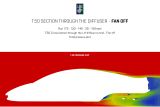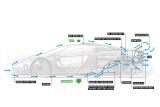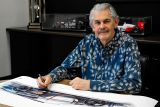A
Auto Express
Guest
Gordon Murray Automotive has released more details on its upcoming, McLaren F1-inspired T.50 supercar, including the specific weight of its powertrain and monocoque. The finished product is expected to make its official debut in May next year, before going on sale in 2022 – with each example carrying a price-tag of £2 million.
The T.50 was dreamt up by the legendary motorsport and automotive engineer, Professor Gordon Murray, who is responsible for the McLaren F1 and the controversial Brabham BT46B fan car. His latest project will be built in Britain in a limited production run of just 100 road-going units, with a further 25 honed for track use.
It will be powered by a naturally aspirated 3.9-litre V12 engine, which was developed by Cosworth. The engine is supported by a 48-volt mild-hybrid system and produces 641bhp as standard – although 690bhp is possible using ram induction.
The engine weighs less than 180kg – roughly 60kg less than the McLaren F1’s powertrain – and it has a red-line of 12,100rpm, which makes it the highest-revving engine ever fitted to a road car. It’ll send drive to the rear wheels only via a six-speed manual gearbox.
The T.50 has been designed with a fastidious approach to weight-saving. Its carbon fibre monocoque weighs around 150kg, while GMA claims the entire supercar will weigh less than 980kg. To achieve such a low kerb-weight figure, GMA has shaved grammes of excess weight off nearly every component in the T.50’s structure.
The supercar’s pedal box is 300g lighter than the McLaren F1’s, while its transmission is 10kg lighter. Its windscreen is made from ultra-thin glass, which is 28 percent thinner than the glass in a typical road car. Meanwhile, the driver’s seat weighs just 7kg – and the two outboard passenger seats weigh less than 3kg each.
GMA’s engineers even modelled the diameter and length T.50’s fixings, to ensure they’re only as strong as they need to be. On the completed product, these 900 nuts, bolts and washers around the T.50’s chassis will be finished in titanium, to keep the supercar’s kerb-weight to a minimum.
Our most recent official image gave us a reasonable indication of the finished model’s styling and revealed some of the groundbreaking aerodynamics that the car will employ. This includes a large 400mm ground-effect fan, inspired by the Brabham BT46B Formula One car, which Murray designed in the late seventies.
But the T.50’s complex aerodynamic systems extend beyond the fan. The car also has active under-body elements and rear aerofoils – and there are six different aero modes. We’ve also been told that the V12 engine and traction control settings will all be configurable.
Until now, all aerodynamic testing on the T.50 has been simulated on a computer through the use of fluid dynamics software, or performed in wind tunnels using static models. However, physical prototypes of the car are being readied for development, with the first driveable development mule set to be completed this September.
Q&A with Gordon Murray

Gordon Murray Automotive T.50 - fan on

Gordon Murray Automotive T.50 - rear teaser

Gordon Murray Automotive T.50 - fan off

image

Gordon Murray Automotive T.50 - infographic

Gordon Murray

image
Born in Durban, South Africa, Murray came to England in the late sixties and forged an engineering career in Formula One, creating a number of title-winning cars
Q: Would you describe this as a McLaren F1 for the modern era?
A: “I genuinely believe no one has done another F1 since the F1, almost 30 years ago, with the sort of focus on the driver, the engineering detail and a lightweight focus. One of the reasons the F1 became iconic is because every single thing for it was bespoke. This gets exactly the same starting point. From that point of view, it’s the F1 for the next generation, with all the same targets. But of course my toybox is much bigger now. We’ve got a much bigger and much more experienced team.”
Q: How many of the T.50’s 100 buyers already have an F1?
A: “I would say about a third are F1 owners. It’s the logical thing to do. The car’s going to be better than the F1 in every single way, so if you’ve got an F1 and you want to keep it without driving around in a £25million car, get in the T.50.”
Q: Is the 980kg weight of the T.50 the headline-grabbing figure?
A: “We’ve had some customers come here and go ‘it’s only got 690bhp!’, but the power to weight is better than a LaFerrari or a McLaren P1 GTR. Do you really need to go 250mph these days? I had no performance targets when I built the F1. It just turned out to be a very quick car. My target for this is it will be the best driver’s car and the most entertaining driver’s car ever made, full stop.”
Q: The F1 won Le Mans in 1995. Could you go racing with the T.50?
A: “I think they’d make us chuck the fan away! But we’ve done over 200 runs in the virtual wind tunnel and the figures it’s making, even without the fan, are competitive. The problem is that we’d have to add 300kg ballast, but I’m talking to the FIA [motorsport governing body] because I’d love to go racing again.”
Q: Is it difficult to homologate a ground-effect fan for a road car?
A: “Believe it or not, there are no regulations. It allows us to control the downforce much more, but it also allows us to do a very clean-looking car. I was desperate to get back to that. I wanted to get away from modern cars with holes and slats and ducts and slices down the sides and all that. The rear end is very technical, but the rest of the car is very beautiful, and I’ve had more fun than I’ve ever had designing this thing.
Q: Beyond the T.50, what vision do you have for Gordon Murray Automotive?
A: “This runs in parallel to the work Gordon Murray Design is doing on all sorts of vehicles. Just to give you a feel for that, we are busy prototyping our first autonomous electric pod, which is a single-person vehicle weighing 400kg. I don’t want to compete with Ferrari or McLaren or Aston Martin or anyone like that. We’ll always just make a few select vehicles for a few discerning people. They will always be unique, low-volume and top of their game.
Are you excited by the Gordon Murray Automotive T.50? Let us know your thoughts below…
Continue reading...
The T.50 was dreamt up by the legendary motorsport and automotive engineer, Professor Gordon Murray, who is responsible for the McLaren F1 and the controversial Brabham BT46B fan car. His latest project will be built in Britain in a limited production run of just 100 road-going units, with a further 25 honed for track use.
It will be powered by a naturally aspirated 3.9-litre V12 engine, which was developed by Cosworth. The engine is supported by a 48-volt mild-hybrid system and produces 641bhp as standard – although 690bhp is possible using ram induction.
The engine weighs less than 180kg – roughly 60kg less than the McLaren F1’s powertrain – and it has a red-line of 12,100rpm, which makes it the highest-revving engine ever fitted to a road car. It’ll send drive to the rear wheels only via a six-speed manual gearbox.
The T.50 has been designed with a fastidious approach to weight-saving. Its carbon fibre monocoque weighs around 150kg, while GMA claims the entire supercar will weigh less than 980kg. To achieve such a low kerb-weight figure, GMA has shaved grammes of excess weight off nearly every component in the T.50’s structure.
The supercar’s pedal box is 300g lighter than the McLaren F1’s, while its transmission is 10kg lighter. Its windscreen is made from ultra-thin glass, which is 28 percent thinner than the glass in a typical road car. Meanwhile, the driver’s seat weighs just 7kg – and the two outboard passenger seats weigh less than 3kg each.
GMA’s engineers even modelled the diameter and length T.50’s fixings, to ensure they’re only as strong as they need to be. On the completed product, these 900 nuts, bolts and washers around the T.50’s chassis will be finished in titanium, to keep the supercar’s kerb-weight to a minimum.
Our most recent official image gave us a reasonable indication of the finished model’s styling and revealed some of the groundbreaking aerodynamics that the car will employ. This includes a large 400mm ground-effect fan, inspired by the Brabham BT46B Formula One car, which Murray designed in the late seventies.
But the T.50’s complex aerodynamic systems extend beyond the fan. The car also has active under-body elements and rear aerofoils – and there are six different aero modes. We’ve also been told that the V12 engine and traction control settings will all be configurable.
Until now, all aerodynamic testing on the T.50 has been simulated on a computer through the use of fluid dynamics software, or performed in wind tunnels using static models. However, physical prototypes of the car are being readied for development, with the first driveable development mule set to be completed this September.
Q&A with Gordon Murray

Gordon Murray Automotive T.50 - fan on

Gordon Murray Automotive T.50 - rear teaser

Gordon Murray Automotive T.50 - fan off

image

Gordon Murray Automotive T.50 - infographic

Gordon Murray

image
Born in Durban, South Africa, Murray came to England in the late sixties and forged an engineering career in Formula One, creating a number of title-winning cars
Q: Would you describe this as a McLaren F1 for the modern era?
A: “I genuinely believe no one has done another F1 since the F1, almost 30 years ago, with the sort of focus on the driver, the engineering detail and a lightweight focus. One of the reasons the F1 became iconic is because every single thing for it was bespoke. This gets exactly the same starting point. From that point of view, it’s the F1 for the next generation, with all the same targets. But of course my toybox is much bigger now. We’ve got a much bigger and much more experienced team.”
Q: How many of the T.50’s 100 buyers already have an F1?
A: “I would say about a third are F1 owners. It’s the logical thing to do. The car’s going to be better than the F1 in every single way, so if you’ve got an F1 and you want to keep it without driving around in a £25million car, get in the T.50.”
Q: Is the 980kg weight of the T.50 the headline-grabbing figure?
A: “We’ve had some customers come here and go ‘it’s only got 690bhp!’, but the power to weight is better than a LaFerrari or a McLaren P1 GTR. Do you really need to go 250mph these days? I had no performance targets when I built the F1. It just turned out to be a very quick car. My target for this is it will be the best driver’s car and the most entertaining driver’s car ever made, full stop.”
Q: The F1 won Le Mans in 1995. Could you go racing with the T.50?
A: “I think they’d make us chuck the fan away! But we’ve done over 200 runs in the virtual wind tunnel and the figures it’s making, even without the fan, are competitive. The problem is that we’d have to add 300kg ballast, but I’m talking to the FIA [motorsport governing body] because I’d love to go racing again.”
Q: Is it difficult to homologate a ground-effect fan for a road car?
A: “Believe it or not, there are no regulations. It allows us to control the downforce much more, but it also allows us to do a very clean-looking car. I was desperate to get back to that. I wanted to get away from modern cars with holes and slats and ducts and slices down the sides and all that. The rear end is very technical, but the rest of the car is very beautiful, and I’ve had more fun than I’ve ever had designing this thing.
Q: Beyond the T.50, what vision do you have for Gordon Murray Automotive?
A: “This runs in parallel to the work Gordon Murray Design is doing on all sorts of vehicles. Just to give you a feel for that, we are busy prototyping our first autonomous electric pod, which is a single-person vehicle weighing 400kg. I don’t want to compete with Ferrari or McLaren or Aston Martin or anyone like that. We’ll always just make a few select vehicles for a few discerning people. They will always be unique, low-volume and top of their game.
Are you excited by the Gordon Murray Automotive T.50? Let us know your thoughts below…
Continue reading...
